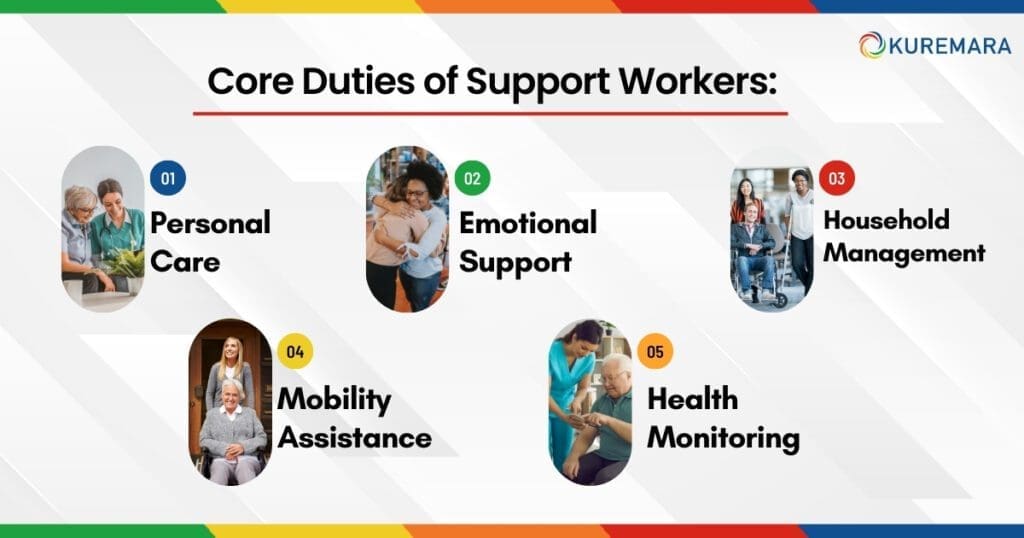Support workers are the unsung heroes of the healthcare and disability sector, providing vital assistance and improving the quality of life for individuals who need support with their daily activities. As the demand for compassionate care grows in Australia, the role of the support worker has become indispensable, especially in the context of the National Disability Insurance Scheme (NDIS). Understanding support worker responsibilities, whether it be through a Registered NDIS Provider or in other healthcare settings, is key to appreciating the profound impact these professionals have on the lives of those they care for.
In this blog, we’ll dive into the evolving responsibilities of support workers, exploring the essential tasks they perform, the skills required to succeed, and the unique role they play within the NDIS framework.
What is a Support Worker?
A support worker is a dedicated professional responsible for providing essential care to individuals who need assistance with daily tasks, whether due to age, disability, or illness. Their duties span from personal care to emotional support, household management, and sometimes even medical assistance. The role varies greatly depending on the client’s needs, but at its core, the support worker’s job is driven by compassion, respect, and the desire to help individuals live fuller, more independent lives.
Core Traits of a Good Support Worker:

- Compassion: The heart of the role, allowing workers to connect deeply with clients.
- Patience: Necessary for handling challenging situations and providing ongoing support.
- Empathy: Helps in understanding clients’ emotional and psychological needs.
Key Support Worker Responsibilities
Support workers provide a wide range of services that address the physical, emotional, and social needs of their clients. These responsibilities often revolve around improving the client’s quality of life, fostering independence, and providing personalised care.
Core Duties of Support Workers:

- Personal Care: Assisting with daily activities such as bathing, dressing, grooming, and hygiene management.
- Emotional Support: Offering companionship and a listening ear to help alleviate loneliness and provide emotional stability.
- Household Management: Helping with household tasks such as cleaning, cooking, and laundry to ensure a safe and clean living environment.
- Mobility Assistance: Supporting clients with moving around their homes or community, often using mobility aids like wheelchairs or walkers.
- Health Monitoring: Assisting with medication management, monitoring health conditions, and coordinating with healthcare professionals.
Detailed Support Worker Duties
NDIS support workers not only focus on physical care and practical assistance but also provide emotional and mental well-being support. Their responsibilities are diverse, and they often need to adapt based on the changing needs of the participant. Let’s dive into the more specialised roles these caregivers take on.
1. Supporting Emotional and Mental Well-being
Caring for the emotional and mental health of NDIS participants is a core responsibility of support workers. Many participants face challenges such as social isolation, anxiety, or depression. Support workers are trained to offer companionship and emotional support that goes beyond just performing tasks.
This includes providing a listening ear, showing empathy, and offering encouragement. A positive, supportive relationship can make a significant impact on a participant’s mental well-being. Support workers also play a vital role in recognising signs of emotional distress, and if necessary, connecting participants with mental health professionals.
For many participants, support workers are trusted individuals who help manage both day-to-day emotional fluctuations and long-term mental health needs.
2. Teaching Life Skills and Promoting Independence

A crucial role of NDIS support workers is to foster independence by teaching essential life skills. These can include:
- Cooking and meal preparation: Guiding participants on how to prepare healthy meals.
- Budgeting and financial management: Assisting with budgeting skills and managing personal finances.
- Household management: Teaching participants how to clean, organise, and maintain their living space.
Support workers empower participants to take control of their lives by developing these key skills. The goal is to help participants become as independent as possible, boosting their confidence and ability to manage on their own.
Each participant’s NDIS plan will outline specific life skills that need development, and the support worker’s role is to provide tailored guidance and training based on these goals.
3. Advocacy and Participant Rights

Advocacy is an often overlooked but critical responsibility of NDIS support workers. Many participants may not be fully aware of their rights under the NDIS or may struggle to navigate the complex systems surrounding disability support.
Support workers advocate on behalf of their participants, ensuring they understand their choices, rights, and entitlements. This may involve:
- Speaking up in medical appointments to ensure participants’ needs are communicated.
- Assisting with the NDIS paperwork and ensuring participants receive the services they’re entitled to.
- Helping participants find and use legal resources when required.
By advocating for their participants, support workers help individuals feel empowered and ensure that they are treated fairly within the disability support system.
4. Coordinating with Healthcare and Other Professionals

A large part of an NDIS support worker’s role is to act as a liaison between the participant and other professionals. This may involve coordinating care with:
- Healthcare providers like doctors, nurses, and therapists.
- Case managers responsible for overseeing the participant’s NDIS plan.
- Other specialists who help with specific aspects of the participant’s care (e.g., physical therapists, speech therapists).
Effective communication is essential. Support workers ensure that all professionals involved are updated on the participant’s current condition, progress, and any changes in their needs.
For participants with complex health needs, this coordination can involve managing multiple appointments, following up on recommendations from healthcare providers, and making sure the care plan is executed properly.
5. Handling Challenging Behaviors and Crisis Situations

Support workers are often on the front lines when it comes to dealing with challenging behaviors or crises. Participants may experience periods of stress, frustration, or behavioral changes due to their disability or other factors. In such cases, NDIS support workers are trained to respond with patience and professionalism.
Common strategies include:
- De-escalation techniques: Calmly managing situations to prevent escalation.
- Behavior management plans: Implementing strategies designed by therapists or behavioral specialists to address specific behaviors.
- Crisis intervention: In cases of emergency, support workers know when to intervene and when to call for specialist help, including emergency services if necessary.
Dealing with challenging behaviors requires not just technical skill but also emotional resilience. Support workers build trust with participants, allowing them to better understand and respond to their emotional and behavioral needs.
Disability Support Worker Duties
For those who work with clients living with disabilities, the role involves unique responsibilities. Disability support worker duties require a customised approach that focuses on promoting independence, empowering clients, and helping them achieve a better quality of life.
Key Responsibilities of Disability Support Workers:
- Promoting Independence: Encouraging clients to complete tasks independently with minimal assistance, boosting their confidence and self-reliance.
- Skill Development: Helping clients develop new skills that enable them to live more independently, such as cooking, cleaning, or managing finances.
- Communication Support: Assisting clients with communication, particularly those with speech impairments or cognitive challenges.
- Home Modifications: Making adjustments to the living environment, such as installing ramps or handrails, to improve accessibility and safety.
NDIS Support Worker Roles and Responsibilities
The National Disability Insurance Scheme (NDIS) plays a significant role in shaping the responsibilities of support workers. NDIS support workers help participants access the necessary services outlined in their NDIS plans. These roles are guided by the NDIS principles of independence, choice, and control, allowing clients to have a say in how they receive support.
Key NDIS Support Worker Responsibilities:
- Assisting clients in understanding and accessing services in their NDIS plans.
- Supporting clients in achieving goals related to independence, skill development, and community participation.
- Working within the NDIS guidelines to ensure compliance with the pricing and service delivery standards.
NDIS support workers must be knowledgeable about NDIS policies and ensure that their services align with the client’s goals and needs. They also collaborate closely with plan managers, coordinators, and healthcare professionals to deliver comprehensive care.
Skills and Qualifications Required for Support Workers
To be effective, a support worker must possess a combination of practical skills and personal qualities that enable them to provide high-quality care. Some essential skills include:
Key Skills for Support Workers:
- Communication: Clear and compassionate communication is essential for understanding clients’ needs and providing appropriate care.
- Empathy: Being able to put oneself in the client’s shoes fosters trust and deepens the support relationship.
- Patience: Many tasks may require time, repetition, and care, particularly when working with clients with complex needs.
- Problem-Solving: Support workers must often think on their feet and come up with creative solutions to help clients navigate challenges.
Must Read: The Importance of NDIS Workers Screening for Quality Care
Recommended Qualifications:
- Certificate III in Individual Support (Ageing, Disability, or Home and Community).
- First Aid and CPR Certification.
- Ongoing Professional Development: Regularly updating skills and knowledge through training courses to stay current with industry best practices.
Challenges and Rewards of Being a Support Worker

Working as a support worker comes with its share of challenges, but it’s also one of the most rewarding careers in the healthcare sector.
Challenges:
- Physical and Emotional Demands: Handling personal care tasks, managing challenging behaviors, and providing emotional support can be exhausting.
- Challenging Work Environment: Some clients may have difficult health conditions, which can make the job mentally and physically demanding.
Must Read: Stay Energised: Practical Tips for Carers to Avoid Burnout
Rewards:
- Making a Real Difference: Support workers often form strong bonds with clients and see firsthand the positive impact of their work.
- Personal Satisfaction: Many support workers report a deep sense of fulfillment knowing they are improving someone’s life and helping them achieve greater independence.
Conclusion
The role of a support worker is central to delivering compassionate, person-centered care in a wide range of settings, from disability and aged care to NDIS services. Their responsibilities are broad, covering everything from personal care to emotional support, but each task contributes to a greater goal—improving the lives of their clients. Understanding the depth and breadth of support worker responsibilities provides a clearer picture of the profound impact these professionals have.
Support workers are agents of change, helping clients achieve independence, navigate life’s challenges, and enjoy a higher quality of life. If you’re a support worker or considering a career in this rewarding field, continue to develop your skills and embrace the opportunity to make a meaningful difference.
 care@kuremara.com.au
care@kuremara.com.au






